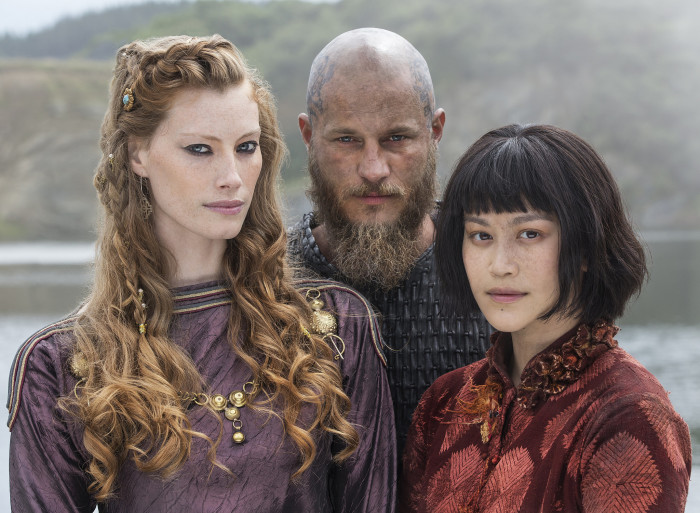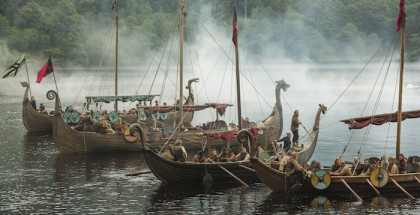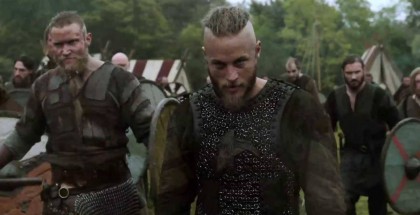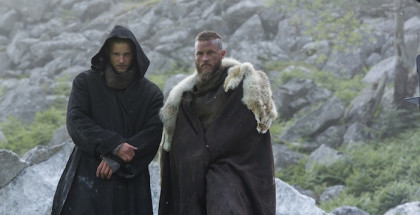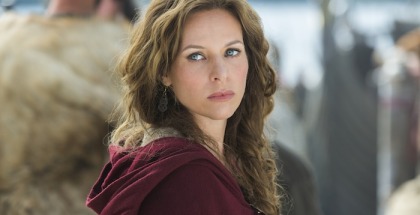UK TV review: Vikings Season 4, Episode 8 and 9
Review Overview
Fathers and sons
8Brothers and sisters
10Leaders and followers
9David Farnor | On 30, Apr 2016
Warning: This contains spoilers.
As Season 4 draws to the end of its first half, Vikings has never been better – and the thrilling double-bill leading up to the mid-season finale is a perfect demonstration why.
The show has always been fascinated by the line between leaders and legends, between those in charge and those who follow, and what it takes for one person to cross that line. As the series has progressed, people (both good and bad) have ascended the power ladder and we’ve seen the corrupting influence of authority, as rulers have taken increasingly compromising steps to seize or maintain their control. Some we have cheered, such as Lagertha dispatching Earl Kalf, and others we have been disgusted by, such as King Ecbert’s backstabbing of anyone who dares to show him their vertebrae.
Only one leader has left us feeling pity: Ragnar Lothbrok, former unrivalled king of Kattegat and now diminishing fast. Where he was once at the head of the pack, now, he’s more likely to be huddled in the corner of a boat getting high on Chinese drugs. That, or getting his butt kicked by his younger brother just outside of Paris.
Harald and Halfdan are naturally disappointed by this mythical hero made weakened mortal, questioning why he’s now leading his people to run away following Episode 7’s skirmish. “What would you have done differently?” asks Lagertha, fiercely loyal, despite her former husband’s failure in the breathtaking battle. “In our world, we cannot accept compromise,” comes the snarling reply. “Someone is always responsible.”
What’s surprising is that Rollo is undergoing the same thing, as seeds of doubt in his skill, honour and embarrassing qualities are sown in the mind of the Emperor. After all, Rollo’s served his purpose, right?
If Count Odo has been one of the weaker story elements in recent seasons of Vikings, it’s to writer Michael Hirst’s credit that he finally dispatches him here, as Therese gets her own back for his 50 Shades of Grey-style naughtiness – in appropriately (and satisfyingly) nasty style. But into his place steps Roland, whom the Emperor promotes to Defender of Paris – while Therese seems positioned to become his mistress. It’s cleaner and tighter than the previous court shenanigans, and the message is clear: these two are dangerous.
And so Rollo is left warning of Ragnar’s return, before they declare him irrelevant – the price, ironically, of him being so good at defending the French capital. Ragnar, meanwhile, assures the troops that they will return to Paris again, this time with a new plan: lifting the boats out of the water and up the cliffs, so they can carry them to the water just by the city, behind the riverside defences, thereby bypassing Rollo altogether. It’s an insane idea and exactly the kind of ambitious, off-the-wall thinking that has previously made Ragnar who he is. Now, though, he comes across as a madman more than a genius. It’s a brilliantly astute piece of writing, highlighting how much each brother needs the other to retain their authority and even define their existence – Ragnar needs to lead another charge against Rollo to prove his mettle, while Rollo needs Ragnar to attack to justify his presence in French court.
Incredibly, the whole thing actually works, not least because of Floki’s determination to make himself useful and loved by Ragnar once more. How fitting that Floki, who is fast becoming the new Kattegat seer, is the one who is able to share Ragnar’s vision and make it a reality. The result is an impressively grimy piece of warfare; proof of the teamwork that goes into the Vikings’ battle tactics, with even Lagertha rejoining the group after taking time out to give birth – the inevitable loss of her child also brings about a union, one that reminds us of just how good a family unit they are. (Katheryn Winnick remains our spirit animal.)
After preparing for Ragnar to make his exit by the end of this first half of Season 4, it’s a surprising about-turn, as Lothbrok reclaims some of the former legendary status that he once had. If that U-turn is a neat achievement, though, what’s even neater is the subtlety with which it’s been orchestrated – throughout the season, Hirst has gently unearthed parallels between his three storylines, something that’s brought gently to the fore. “How strange life is…” both Ecbert and the Emperor muse, as they consider the behaviour of their children, whether biological (Aethelwulf) or adopted (Rollo).
In addition to leadership, Vikings has always been preoccupied with the boundary between generations, as sons and daughters grow to inherit the legacy of their parents. Bjorn is looking more and more like the leader to take over when Ragnar shuffles off his mortal coil – something that becomes even more apparent, as Torvi has visions of Erlendur killing him, revealing just how much we’ve become attached to little old Bjorn. The fact that he convinces Torvi to shoot Erlendur (with a crossbow, no less – Vikings remains wonderfully gory) rather than him demonstrates even further his powers of persuasion; it’s the same brand of confidence and charisma that saw Ragnar lead the Vikings for all those years. When he puts Erlendur’s ring on the bolt in his chest, some of that cocky arrogance too.
Ivar is less of a prize son, though: after killing another kid with a hatcher, here, he’s on a brat rampage once more, calling his mum stupid and saying he doesn’t care about Bjorn’s sister drowning in the river. (This is the second time a Siggy has died while Harbard’s been in town. Does that make him more or less of a divine figure?)
Sigurd sees it all, but can do nothing – something that, again, is echoed in the hills outside Paris, where Ragnar ends up killing Yidu, after she tries to go free and threaten what happened to the Viking troops Ragnar left back in Wessex. Seeing Ragnar cross the line into murder is hardly anything new, but what’s telling is that his sons witness him do it. At the asme time, Aslaug’s offspring see her fight with Harbard, as she (justifiably) complains about him being a promiscuous douche.
In Wessex, Ecbert is also murdering to stay in power – but this time, it’s Judith who commits the deed. When Kwentrith figures out what’s going on, and tells Judith, Ecbert’s lover only ends up betraying the princess and stabbing her literally in the back. It’s an act that seals their unholy union, while her son, Alfred, continues his pilgrimage to Rome, blindly believing the thorn he’s shown by the Pope to be the one from Jesus’ crown. If only Ragnar’s children could have such unseeing, unswerving faith in the father figures around them.
With all that going on, you could be forgiven for thinking Vikings has slowed down its pacing, but if anything, Season 4 has sped up with every episode, as we’ve swiftly hopped from Ragnar’s return from Paris to his addiction to Yidu’s medicine to his realisation that he doesn’t need it for surviving now, but for being strong enough to face Rollo. Confessing it to Bjorn (an act that cements the passing the buck of responsibility down from father to son, it sets the stage for a finale that promises to put the personal and political head-to-head. While unanswered questions swirl round the threat of Harald and Halfdan – after assaulting a family they come across, what on earth will they do next? – the real mystery is simple: who will win, Ragnar or Rollo?
Vikings: Season 4 is available to watch online in the UK on Amazon Prime Instant Video, as part of a £5.99 monthly subscription. Seasons 1 to 3 are also available.


